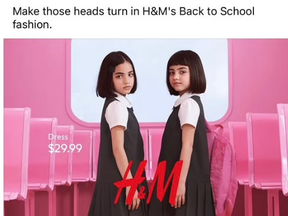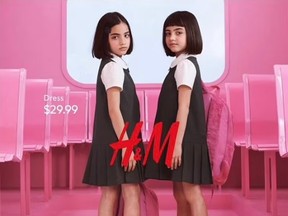
Reviews and recommendations are unbiased and products are independently selected. Postmedia may earn an affiliate commission from purchases made through links on this page.
Article content
H&M has removed an online advertisement for children’s clothing in Australia and issued an apology following complaints that the image and message sexualized young girls.
Advertisement 2
Story continues below
Article content
“This ad has now been removed,” the clothing company said in recent replies on X. “We are deeply sorry for the offence this has caused and we are looking into how we present campaigns going forward.”
Article content
The H&M ad showed two young girls wearing short black dresses and the tagline, “Make those heads turn in H&M’s Back to School fashion.”
The image was brought to attention on social media by Australian author Melinda Tankard Reist, who describes herself as an “advocate for women and girls.”

She posted a screengrab of the ad on social media and asked the company what their intention was with the sponsored Facebook post.
“Little schoolgirls generally don’t want to ‘turn heads’. The large numbers I engage with in schools want to be left alone to learn and have fun and not draw unwanted attention to their appearance,” she wrote.
Recommended from Editorial
-

‘Racist’ Ghislaine Maxwell and Jeffrey Epstein weren’t OK with Black people, victim claims
-

Texas man pleads guilty to kidnapping teen whose ’Help Me’ sign led to rescue
-

CRIME HUNTER: Sex, drugs and a lesbian love triangle in Texas
“The little girls parents generally prefer heads don’t ‘turn’ when others see their daughters walking to school, on a bus or in class. Why would you want to fuel the idea that little girls should draw attention to their looks, bodies and ‘style’?”
Advertisement 3
Story continues below
Article content
Tankard Reist suggested the company’s marketing team needs to come up with a better campaign to sell children’s clothing, something that “doesn’t draw attention to pre-pubescent girls already struggling to thrive in a culture that values ‘lookism’ as an aspirational goal.”
One critic said the promo was “yet another example of deeply embedded misogyny,” while another suggested it contained “gross marketing.”
“It’s bonkers,” wrote a third commenter. “I’m not a witch-hunty sort of person — we’re humans, we all make mistakes — but this isn’t an issue of HOW they present future campaigns, but WHY nobody in the company realized this was problematic until people on social media pointed it out.”
RECOMMENDED VIDEO
Article content




Comments